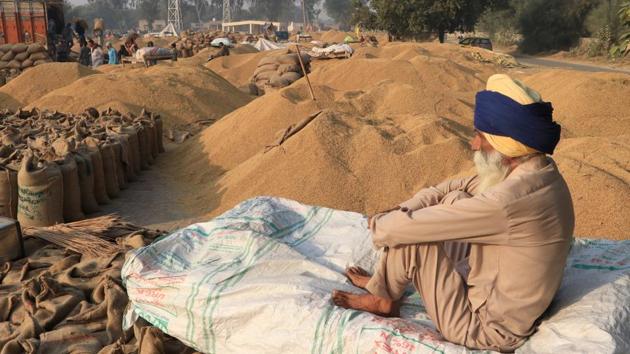In Punjab, the centrality of the mandi system
The mandi has been a major rallying cry for the protests in Punjab. Its importance to agricultural life cannot be overstated
The stand-off between the government and the farmers on the new farm laws shows no signs of easing. For a long time, the government insisted that the protest was led by middlemen and large farmers only in Punjab, and to some extent Haryana, who were concerned about losing their privileges. However, the expansion of the movement and organised support for it in other regions have defied these claims and left almost everyone surprised.

Nevertheless, the mobilisation across all sections of Punjab’s society, even the diaspora, unseen in any other region, in support of these protests warrants an explanation.
The mandi has been a major rallying cry for the protests in Punjab. Its importance to agricultural life, as it has developed over the past half a century in the state, cannot be overstated. Under the mandi system farmers bring paddy and wheat to the shop of the commission agent (arhtia) in regulated Agricultural Produce Marketing Committee (APMC), or mandi, yards for sale. Any amount of these crops within certain quality standards is purchased by the government, through the Food Corporation of India and other state-level procurement agencies, at the Minimum Support Price (MSP) (also known as “open procurement”).
This assured purchase at MSP has been the main source of income support for Punjab’s farmers. Of course, larger farmers have benefitted disproportionately more than smaller ones. The former can avail of economies of scale in production and bring larger crop volumes to the mandi. Smaller farmers face higher input costs (for example, costs of renting in machinery) and bring lower volumes of crop (sometimes even lower quality if they are unable to purchase and apply inputs in a timely way). But to say that the mandi system does not benefit the smaller farmers is a bit of a stretch. Even for them, the system provides an important safety net, an assurance that, at the least, they can expect a certain amount of household income through the agricultural year. Expenses and debts can be managed against that.
Certainly, as the government constantly reminds us, commission agents have also been key beneficiaries of this system. Commission agents in the grain mandis of Punjab get a commission of 2.5% of total sales from the buyer among the highest in the country. In fact, it is on the basis of this assured transaction that they also extend informal credit to the farmers at very high interest rates. Given that the new farm laws are likely to undermine the mandi system (indirectly, even if not stated explicitly) which is crucial to their business, it is no surprise that they too are supporting the farmer protest.
But what is really notable is that protesting farmers too are consistently justifying the role of the agents. Why? To some extent, it is because a small section of large farmers has also become commission agents. But in addition, moneylending by them constitutes crucial financial support for farmers when credit from commercial banks and cooperatives proves inadequate, which is often the case. This is particularly true for smaller farmers, who often have to deal with the harshest interest rates but also have no other source of credit support. There is no reason to believe that the reformed markets in the wake of the new laws will not have middlemen, and farmers worry about whether these new middlemen will extend similar support to them.
There are other, less obvious, ways in which the rhythms of Punjab’s local agrarian economy are dependent on the mandi system. It is when the farmers sell their crop that they have the income (or the next round of credit) to pay rent for leased land and pending wages to farm labourers.
It is also then that they buy inputs for the next crop and make other kinds of household purchases, ranging from groceries to medicines for the elderly and stationery for the children. Landless rural populations, some of whom still work as farm labourers, also know that the subsidised rations they receive depend on the government’s purchase of surplus wheat and paddy. There is much to be said about the work of some of the state’s more progressive farmer and farm labour unions in creating this awareness and building alliances with other sections of society to broad-base the support for the protest. But even otherwise, it is commonly understood that the mandi system is the lifeblood of Punjab’s agricultural, even small-town economies.
All this is hardly to say that the mandi system is devoid of problems and does not need serious reform. I have already mentioned the predicament of small farmers and the contentious role of commission agents. Years of paddy and wheat monocropping — enabled through this system — have severely affected soil fertility, groundwater availability and yields. But equally, efforts towards crop diversification have been half-hearted and ineffective.
Meanwhile, non-agricultural employment opportunities are dismal and the state government’s finances are in shambles. So, while the state clutches at straws, the new laws offer nothing to calm the anxieties of its people about life after the mandi system.



